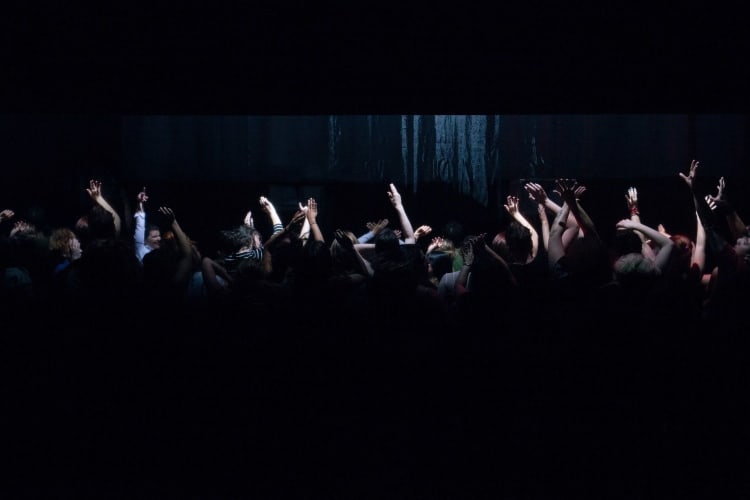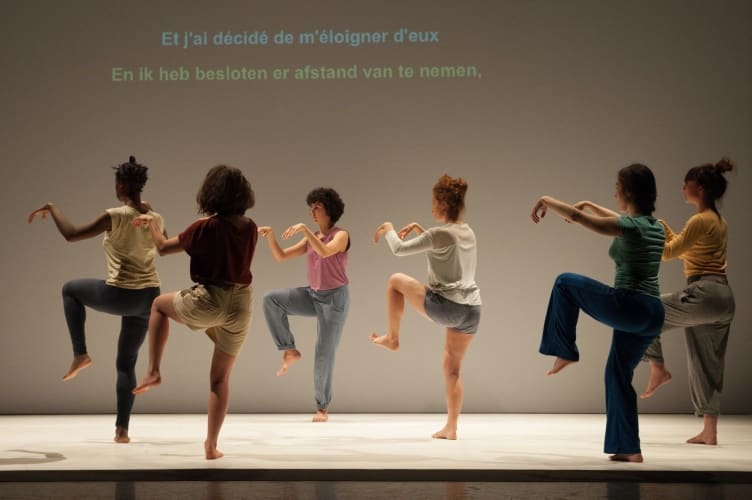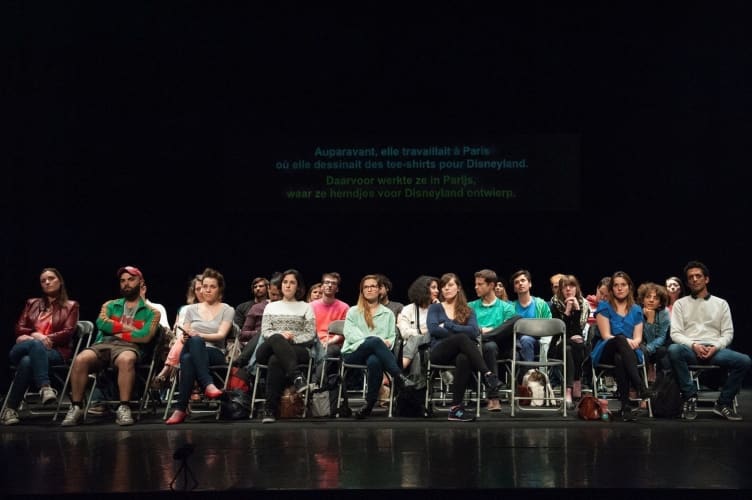Guerrilla is an oddity, and all the better and more indelible for it—all the more reason to celebrate the Transform Festival’s outward-looking, forward-thinking and variegated offering this year.
Combining elements of art installation, short fiction and performance, the piece presents a socio-political dissection of very current anxieties. It does so by projecting forwards, to 2019 and the declaration of a Sino-Russian non-aggression pact which paves the way for a set of aggressive manoeuvres and eventually world war in 2023.
But first it faces us with an audience: on stage is another bank of seats, which gradually fills with individuals, pairs and groups chatting and arranging their coats, just as we have. They are expectant, just as we are. Then the main dramaturgical device of the performance becomes clear. Surtitles appear above the stage a line at a time and we slowly piece together the situation (a public conference / interview) and figure out who these people are waiting for (the renowned Italian theatremaker and writer Romeo Castellucci) and where we are (Leeds, on this date two years hence).
Intriguingly, the simple but elegantly crafted text begins to narrate personal stories of some of the individuals we see on stage. So as we hear Castellucci interviewed, in Italian, over the PA system and the onstage audience looks out attentively, we the other spectators are reading about incidents from their childhood, elements of their day-to-day lives: glimpses into the autobiographical information silently carried around by each individual in this room.
The formal game seems largely to be one of “offered without comment”. So chimes and ironies thrown up by the jarring or gelling of text and onstage “action” (there is very little, in these opening moments at least) seem coincidental and are left to the observer to piece together. As the titles recount stories of grandfathers dying in World War II, the soundtrack happens to mention theatre and “la vita”, life. A coincidence maybe, but like with an installation work or impressionistic fiction, these incidents and accidents are what we latch onto.
There is a clear through-line in the thinking, though, which sees World Wars as inevitably repeating, the response to a global (or Western, more precisely) decadence which needs, like a recalcitrant child, a good spank. This and other such thoughts are again mooted in the form of anecdotes recounted, according to the narrating surtitles, by a friend or a family member of the individuals we’re observing.
And these onstage performers never speak a word, after the opening in which inaudible chatter accompanies their entrance into the space. All two dozen or so of them are wordlessly attentive to the offstage speakers in the first section. Then a smaller group enacts a tai chi class—the slow, silent art of shifting poise. And finally we see a rave; the whole cast assembled, facing away from us, pogoing and dancing together to one ear-ringingly loud beat for what seems like an age.
So the verbal content of the piece consists only of that presented in written form. The text provides fascinating, tricky slippages between 2019, 2023 and the pasts of the people involved. It also flits between tenses and realities, and offers a series of lacerating, laser-guided lancings of liberal anxieties around globalisation, militarisation and neoliberalism.
At times, I did wonder if it was slightly too snugly fitting to such leftist fears. There is apparently an element of the text personalised through work with the community participants, though there are questions here around what agency and input they have had, and how trammelled the narrative is in fact. But again, as the text is offered without editorialisation, each observer is free to question its ownership, to make connections and deductions, to admire or reject its propositions.
This text itself is elegant and sinuous and poses a curious and uncanny effect as apparently drunken conversations are recounted in a literary prose which always intrigues. The piece as a whole provoked quite qualitatively different responses: for me it was an intensely intellectually engaging work; my companion found it viscerally and emotionally affecting. We agreed that it was both a timely and an enduring experience.
On its web site for the show, El Conde de Torrefiel quotes Walter Benjamin’s interpretation of Klee’s Angelus Novus as the angel of history who looks back on a mountain of wreckage and is blown by an irresistible tempest towards an unknown future. “This storm is what we call progress”, Benjamin concludes. Guerrilla asks, then, whether we have any real alternative to the storm—now, or ever.


